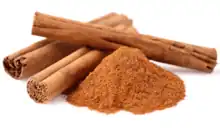Zimt
German
Pronunciation
- IPA(key): /t͡sɪmt/
Etymology 1
From late Middle High German zimet, from earlier zinemīn, zinment, from Latin cinnamon, cinnamomum, from Ancient Greek κιννάμωμον (kinnámōmon), later κίνναμον (kínnamon), according to Herodotus from Phoenician, cognate with Hebrew קִנָּמוֹן (qinnāmōn).
Noun

der Zimt
Zimt m or n (strong, genitive Zimtes or Zimts, plural Zimte)
- (uncountable) cinnamon
- 2013, Hanna Dinkelbach, Zimt-Missbrauch: Das Risiko als letzte Würze, in: Website of Westdeutsche Allgemeine Zeitung
- Die Einnahme von Zimt löst einen schweren Würgereflex aus, weil das Gewürz in Mund und Rachen brennt, erklärt Hower: „Beim Luftholen kann das Zimt in die Lunge gelangen“.
- The consumption of cinnamon provokes a strong pharyngeal reflex because the spice stings in the mouth and throat, Hower explains: “When taking a breath, you can get the cinnamon into your lungs.”
- 2013, Hanna Dinkelbach, Zimt-Missbrauch: Das Risiko als letzte Würze, in: Website of Westdeutsche Allgemeine Zeitung
- (countable) a particular kind of cinnamon
- (uncountable) the brownish colour of cinnamon
Usage notes
- Traditionally and predominantly masculine, but also used as a neuter by some speakers. As a colour it is usually neuter.
Declension
Alternative forms
- Zimmet (archaic)
Derived terms
- zimt
- zimtartig, zimtfarben
Related terms
- Zimtaldehyd, Zimtbaum, Zimtöl, Zimtschnecke, Zimtstange, Zimtstern, Zimtzucker
Descendants
See also
Etymology 2
From Rotwelsch Zimt (“gold”).
Declension
Related terms
This article is issued from Wiktionary. The text is licensed under Creative Commons - Attribution - Sharealike. Additional terms may apply for the media files.